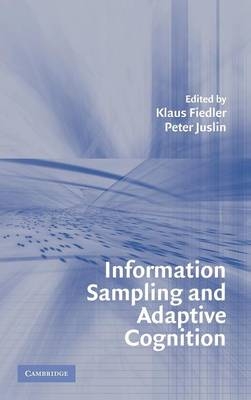
Information Sampling and Adaptive Cognition
Cambridge University Press (Verlag)
978-0-521-83159-8 (ISBN)
A 'sample' is not only a concept from statistics that has penetrated common sense but also a metaphor that has inspired much research and theorizing in current psychology. The sampling approach emphasizes the selectivity and the biases that are inherent in the samples of information input with which judges and decision makers are fed. As environmental samples are rarely random, or representative of the world as a whole, decision making calls for censorship and critical evaluation of the data given. However, even the most intelligent decision makers tend to behave like 'näive intuitive statisticians': quite sensitive to the data given but uncritical concerning the source of the data. Thus, the vicissitudes of sampling information in the environment together with the failure to monitor and control sampling effects adequately provide a key to re-interpreting findings obtained in the last two decades of research on judgment and decision making.
Klaus Fiedler is Professor of Psychology at University of Heidelberg in Germany. Among his main research interests are cognitive social psychology, language and communication, social memory, inductive cognitive processes in judgment and decision making, and computer modeling of the human mind. Professor Fiedler was the winner of the 2000 Leibniz Award. Peter Juslin is Professor of Psychology at Uppsala University in Sweden. He received the Brunswik New Scientist Award in 1994 and the Oscar's Award at Uppsala University in 1996 for young distinguished scientists. He has published a large number of scientific papers in many journals including many articles in the main APA-journals such as Psychology Review.
Part I. Introduction: 1. Taking the interface between mind and environment seriously Klaus Fiedler and Peter Juslin; Part II. The Psychological Law of Large Number: 2. Good sampling, distorted views: the perception of variability Yakoov Kareev; 3. Intuitive judgments about sample size Peter Sedlmeier; 4. Risky prospects: when valued through a window of sampled experiences Ralph Hertwig, Greg Barron, Elke Weber and Ido Erev; 5. Less is more in contingency assessment - or is it? Peter Juslin, Klaus Fiedler and Nick Chater; Part III. Biased and Unbiased Judgments from Biased Samples: 6. Subjective validity judgments as an index of sensitivity to sampling bias Peter Freytag and Klaus Fiedler; 7. An analysis of structural availability biases and a brief study Robyn Dawes; 8. Subjective confidence and the sampling of knowledge Joshua Klayman, Jack Soll, Peter Juslin, and Anders Winman; 9. Contingency learning and biased group impressions Thorsten Meiser; 10. Mental mechanisms: speculations on human causal learning and reasoning Nick Chater and Mike Oaksford; Part IV. What Information Contents Are Sampled?: 11. What's in a sample? A manual for building cognitive theories Gerd Gigerenzer; 12. Assessing evidential support in an uncertain environment Chris M. White and Derek Koehler; 13. Information sampling in group decision making: sampling biases and their consequences Andreas Mojzisch and Stefan Schulz-Hardt; 14. Confidence in aggregation of opinions from multiple sources David Budescu, Adrian K. Rantilla, Tzur M. Kareliz and Hsiu Ting Yu; 15. Self as a sample Joachim Krueger, Melissa Acevedo and Jordan Robbins; Part V. Vicissitudes of Sampling in the Researcher's Mind and Method: 16. Which world should be represented in representative design? Ulrich Hoffrage and Ralph Hertwig; 17. 'I'm m/n confident that I'm correct': confidence in foresight and hindsight as a sampling probability Anders Winman and Peter Juslin; 18. Natural sampling of stimuli in (artificial) grammar learning Fenna Poletiek; 19. Is confidence in decisions related to feedback? Evidence - lack of evidence - from random samples of real-world behavior Robin Hogarth.
| Erscheint lt. Verlag | 19.12.2005 |
|---|---|
| Zusatzinfo | 38 Tables, unspecified; 61 Line drawings, unspecified |
| Verlagsort | Cambridge |
| Sprache | englisch |
| Maße | 152 x 229 mm |
| Gewicht | 780 g |
| Themenwelt | Geisteswissenschaften ► Psychologie ► Allgemeine Psychologie |
| Geisteswissenschaften ► Psychologie ► Verhaltenstherapie | |
| ISBN-10 | 0-521-83159-8 / 0521831598 |
| ISBN-13 | 978-0-521-83159-8 / 9780521831598 |
| Zustand | Neuware |
| Haben Sie eine Frage zum Produkt? |
aus dem Bereich


